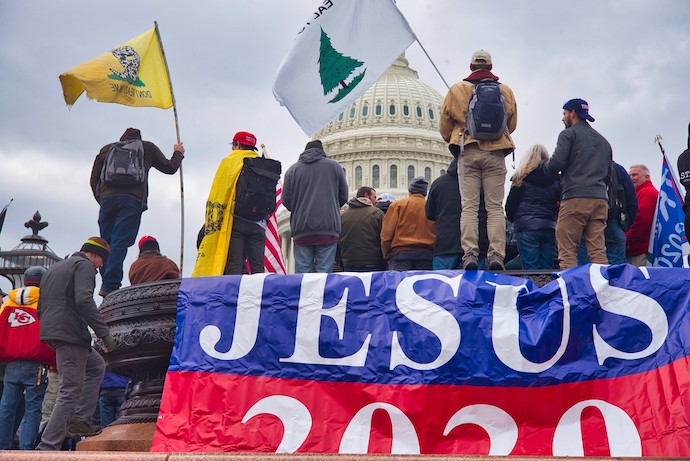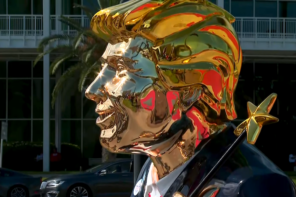Are conservative, mostly white evangelicals, finally losing control of their narrative in the public sphere, where Christian supremacist assumptions have up to now led to the effective silencing of ex-evangelical and critical scholarly voices? Recent developments suggest that a significant shift may be underway. Up to now, most coverage in major outlets has portrayed what is an essentially authoritarian religious and political demographic in an unduly positive light, whitewashing the centrality of white supremacism and patriarchy in evangelicalism. There’s a whole sub-genre of religion journalism that conjures an unrealistic picture of ostensible generational change among evangelicals by focusing on anecdotes about young people who are far from typical, while conveniently eschewing data.
The PR-savvy, connections, rebranding skills, and deep-pocketed lobby possessed by elite evangelicals make for a far from level playing field, and elite evangelicals have used these advantages to maintain a “respectable” image for evangelicalism. As an ex-evangelical observer and critic of these media trends, I have more or less gotten used to feeling like “a voice crying in the wilderness.” I am in general quite unaccustomed to optimism, which has never come naturally to me, and yet, to my surprise, I think we may have actually arrived at a sustained shift in the national discussion of religion and politics in the direction of fairer, more accurate representation of evangelical Christianity in the elite public sphere.
Noting the critical focus on Christian nationalism in coverage of the January 6 insurrection even in such outlets as The New York Times and The Washington Post about six weeks ago, I suggested we might be seeing a turning point in what perspectives and contexts are included in coverage of evangelicalism. My optimism was tempered and cautious, and it remains so now, but subsequent developments seem to be bearing out that initial contention. In the wake of the racist Atlanta spa murders, for example, my analysis of the likely role played by evangelical purity culture—itself grounded in racism and misogyny—went viral, and the legacy media continued the discussion, with The Washington Post adding a critical look at discredited evangelical therapeutic practices related to “sex addiction” (which is not an established diagnosis and certainly not a justification for murder).
Meanwhile, evangelicals have started to exhibit clear concern over their loss of control over their public image. Pointing to “hackneyed attempts” by evangelicals to reframe the conversation around the deconstruction of conservative Christianity with campaigns like #revangelical, the ex-evangelical podcaster Blake Chastain (full disclosure: we’ve been friends for years) argued in a March 12 Substack post: “Let’s be clear: White evangelical institutions will endure. They remain well-funded. But they have lost something they’ve long controlled: the narrative.”
Chastain maintains, surely correctly, that evangelicals’ Trump support, culminating in the obvious evangelical presence at the January 6 insurrection, is one important reason evangelical attempts to save face are now falling short. But he also credited those of us who have been speaking out over the last few years with influencing the change that seems to be underway:
The steady work of people publicly sharing their stories of deconstruction, their stories of abuse, their stories of triumph and flourishing after leaving evangelicalism over the past several years is yielding results. Hashtags like #exvangelical, #EmptyThePews, #ChurchToo, #deconstruction, #decolonize, #religioustrauma, and #LeaveLoud make it much easier for those still embedded in these communities [to find validation in leaving] than it has been in the past. Podcasts and books and Instagram feeds and Facebook groups explore these topics from all manner of perspectives, and do not require a particular set of theological belief[s].
In addition to evangelical attempts to appropriate the concept of religious deconstruction, elite evangelicals have issued testy responses to the viral discussion of purity culture, racism, and misogyny that followed the Atlanta spa murders. Never-Trump conservative pundit David French made a dubious and unconvincing attempt to dissociate purity culture from Christian “orthodoxy” on sexuality and gender, as if the balls and rings and pledges themselves are the only real problem, rather than the underlying theology that gives rise to such creepy and obsessive practices, not to mention the predominance of disinformation heavy, shame and guilt inducing abstinence only sex “education.”
President of the Southern Baptist Theological Seminary Al Mohler similarly argues that there’s nothing wrong with fighting against “lust,” given that reserving sex for one-man, one-woman marriage “is basic Christianity,” and that Jesus claimed looking lustfully at a woman is just as sinful as adultery. Mohler wants us to empathize with how “difficult” it is for parents, pastors, and youth pastors to teach about “a healthy sexuality” within those heteronormative, paranoid strictures—and I guess I’ll grant him that, because there’s no such thing as a healthy sexuality based in repression and alternative facts. He also scolds Skidmore College religious studies professor Bradley Onishi, an Asian-American ex-evangelical, for describing evangelical teachings about sexuality to New York Times reporter Ruth Graham “in very negative terms as teaching women to hate their bodies as a source of temptation and teaching men to hate their minds, which lead them into lust and morality [sic.].”
Onishi also attracted the ire of Jim Daly, the successor of James Dobson as president of the notorious Focus on the Family. Daly contemptuously referred to Onishi as “a ‘former’ evangelical,” with the scare quotes around “former” not only signaling displeasure with the fact that ex-evangelical perspectives are being taken seriously by The New York Times, but also, as only those familiar with evangelical subculture would know, implying that Onishi must never have been “truly saved” in the first place. The gratuitous pettiness of the gesture suggests that Daly is very upset about the critical scrutiny currently being directed at evangelicalism.
To be sure, bad faith claims of “persecution” and “misunderstanding” attached to grievances about how “the world” views evangelicals are evangelical stock-in-trade. No matter how positively evangelicals are portrayed in the media, they will never be satisfied that it’s positive enough. Right-wing partisans in general have very successfully used false claims of “unfair treatment” to silence their critics and shift political discussion in their favor in recent decades, and evangelicals’ whining and badgering has surely been part of what’s kept most coverage of evangelicalism favorable. Still, something about the current round of hand-wringing is different. It’s rare for evangelicals to draw specific attention to ex-evangelicals, engaging with us and our arguments explicitly and by name rather than simply pretending we don’t exist, or occasionally talking about straw-man versions of us. Now, they’re naming people like Onishi—and also me.
In a recent Christianity Today column, conservative editor and commentator Bonnie Kristian pushed back on my discussion of Christian schools as sources of the extremism we saw on January 6. In her article, which I responded to in The Conversationalist, Kristian focuses on an extremely narrowly defined Christian nationalism that she can get on board with criticizing, conveniently skirting the pervasive racism and other serious issues with evangelical educational institutions and curricula, all the while creating a false equivalence between Christian schools and public schools by gesturing to the fact that public schools also instill nationalism with the pledge to the American flag.
But what’s most important to note with respect to these mental gymnastics is that Kristian is clearly playing defense, just as Mohler and Daly and French are in their responses to widely read criticism of evangelical purity culture. There’s a kind of desperation here, a protesting too much, and it’s a clear indication that elite evangelicals are running scared. They sense that the discussion of evangelicalism in the elite public sphere really has changed, and that they’re no longer allowed to frame every issue related to their religious community uncontested. Indeed, in addition to the coverage already mentioned, recent stories in The New Republic and Vice have shined a sympathetic light on ex-evangelical experiences and concerns.
Because humans live through narratives, stories have power. Blake Chastain understands this, which is why his Exvangelical podcast largely focuses on creating space for former evangelicals to share our stories. Asked to comment for this piece, Chastain said, “I am thankful for the recent coverage of ex-evangelical stories. I believe that members of the exvangelical dispersal are uniquely positioned to help the broader population understand the anti-democratic, anti-pluralist agendas sought by white evangelicals.”
Evangelicals also understand the power of narrative, which is why they’re so concerned with controlling the stories the public hears not only about themselves, but also about those of us who leave evangelicalism and tell the truth about how it has harmed us, criticizing evangelical theology as well as the racism, misogyny, anti-LGBTQ animus, and culture-warring politics that theology bolsters. As evangelicals’ own story of engaging politically out of serious concerns about morality and “sincerely held religious beliefs” has lost influence with the public because of the transparent hypocrisy they displayed through the Trump years, space has opened up for a shift in the national discussion that includes a sympathetic hearing for ex-evangelical stories and perspectives. Shifting the national conversation, as elite evangelicals and right-wing political strategists are well aware, lays the groundwork for shifts in politics and policy.
That’s what’s really at stake here. The possibility of a more equitable America, one that affords full rights to members of the groups that evangelicals tend to ‘other’ and disparage, is the last thing the vast majority of white evangelicals, who have a pathological need to feel superior to others, want. Here’s hoping the fairer journalistic approach to evangelicals we’ve seen in recent months, which bolsters civil society and democracy instead of undermining it through the normalization of extremism, will continue.





